Who will bridge promise and performance?
By RN Bhaskar and Sakeena Bari Sayyed
Picture source: https://www.youtube.com/watch?v=FyDHRpM2iNU
Government engineers and supervisors can be terribly incompetent even capricious. Two data points provide ample evidence of this. The first is how two parts of a bridge in Mumbai were constructed in such a way that they were totally out of alignment (https://indianexpress.com/article/cities/mumbai/gokhale-bridge-flyover-misalignment-both-structures-to-be-aligned-in-phase-2-work-of-project-p-velrasu-9195741/), as the image above shows. The second example is of Bihar — where twelve bridges collapsed within thirteen days (https://timesofindia.indiatimes.com/india/bridge-collapses-in-bihar-again-13th-in-3-weeks/articleshow/111635548.cms). In any other country, achieving such standards of recklessness would have required immense effort. India appears to have mastered the art of effortless irresponsibility.
It wasn’t always this way. India has prided itself in making some of the best bridges in the world. Consider for instance the Mahim causeway. This bridge was funded and built by private individuals (Lady Jeejeebhoy- https://youtu.be/c1l09R0nUAw?si=z0dutc0Xi12S2HlC). It has survived over 150 years without requiring reconstruction or major repairs. It will be difficult to find any bridge constructed by the Brihanmumbai Municipal Corporation (BMC), the state government, or even the centre which matches such excellence.
In fact, barely 25 years ago the BJP government headed by Atal Bihari Vajpayee built India’s largest infrastructure project of that time, the Golden Quadrilateral (GQ) without any time or cost overruns. The prime minister then did not talk about Viksit Bharat. Instead, he ensured that the country could match both promise and performance. Today, as the table above confirms, corrosion has set in. It is no coincidence that the top five states that have witnessed the largest number of bridge collapses in recent times are BJP ruled states (more details – https://www.newslaundry.com/2025/07/29/4-years-170-collapses-202-deaths-whats-ailing-indias-bridges). For a political class that had promised less government, more governance, the data above should be discomforting, if not shameful.
There is no sense blaming states for mismanaging infrastructure creation. The record of the central government in building bridges is equally pathetic and worrisome. The number displayed above shows how shoddy bridge construction has been even on national highways which mostly come under the central government’s NHAI.
The collapse of these bridges has not only meant a loss and waste of tax-payers’ money, but also of human lives. In most cases the compensation paid for such loss of life has been paltry.
One reason for this is the immunity from prosecution that government officials enjoy. No government official can be sued by a private citizen or organisation without the consent of the immediate superior of the accused official.
This is a mockery of the law of Tort. This is meant to be a remedy, typically monetary damages, to compensate the injured party for the loss or injury individuals suffer due to the wrongful action or omission of another party which allows individuals to claim damages and compensation for any harm caused to them. Unfortunately, in India, government bodies and officials are exempted from any application of this law. Thus, while Tort is taught in law schools in this country, it has little application in public life.
The only time citizens get compensated is when insurance companies step in (https://timesofindia.indiatimes.com/city/mumbai/mumbai-rs-25-lakh-awarded-to-kin-of-man-killed-in-2020-road-mishap/articleshow/124770916.cms). It is the insurance companies that compel local authorities to pay for the damages caused. That raises a fundamental question. Why don’t government departments also take up insurance policies which reimburse individuals for the damage they suffer? Insurance companies would have the clout to insist that an inefficient contractor or an inspector should not be given jobs which demand accountability or responsibility. Is the government determined to penalise citizens for no fault of theirs?
The woeful consequences of this denial of justice is brought out quite eloquently by Kuldeep Sharma, editor Pulse (https://youtube.com/shorts/OKDM5wbd3kI?feature=share). He bemoans the tragedy faced by families when human lives are lost — primarily because some government-mandated boiler-inspector does not perform his duties responsibly. He certifies a boiler that may not be fit to be used. Yet, he is allowed to go scot-free.
The story is the same everywhere. Policemen are seldom dismissed; they are merely suspended and reassigned duties in some other place. Ditto with government officials. The same is even true of thoughtless judgements pronounced by the judiciary. A recent example is the pronouncement which allowed substandard medicine to continue to be sold to an unsuspecting public (https://x.com/NalinisKitchen/status/1981664403201085663).
It is a same disdain for accountability that has caused multiple child deaths because of substandard cough syrups being sold (Free subscription – https://bhaskarr.substack.com/p/cough-syrup-deaths-indias-drug-authorities).
The government has created a Frankenstein which has now begun to destroy the very citizens of the country. Ironically, they voted legislators to power, who in turn created rules that are unfriendly to people. What is worse, tax-payers are compelled to also pay for the costs of mismanaged projects.
The next time the government’s economic survey talks about how India’s Gross Fixed Capital Formation (GFCF) has improved, a lot of scepticism is required.
The government spends on projects that are not really as relevant as those shelved aside. The postponement of the Western Dedicated Freight Corridor (DFC) is a glaring example (Free subscription — https://bhaskarr.substack.com/p/indias-two-dfcs-politics-trounces).
Over the years, the government has made it so difficult for private sector players to participate in infrastructure building, that they have opted to stay away from this activity. That effectively gives the government a wonderful justification for stepping in and picking up the project itself. Consequently, government expenditure on infrastructure building – that includes bridge construction – keeps increasing. If one takes into account the quality of construction, and the escalation in costs on account of implementation delays, the eventual costs are significantly higher than what private sector players had been demanding. Effectively, the private sector gets marginalised.
Ironically, this gives the government the excuse to complain that the private sector has not taken up the job of nation building. Maybe, the government should examine its own track record before making such charges. It would have been more prudent to allow the private sector higher profits than to allow the government to take up projects. You would have fewer bridge collapses. And since private companies are subject to the Tort Law, victims of negligence could demand compensation as well.
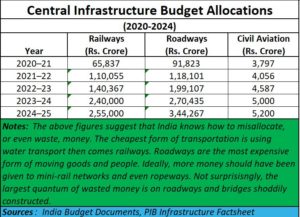 That is why any exercise involving budgetary outlays for infrastructure can become laughable unless the basic law of immunity for government officials is modified.
That is why any exercise involving budgetary outlays for infrastructure can become laughable unless the basic law of immunity for government officials is modified.
The budgets are baffling for two reasons. First, a significant part of the budget goes towards meeting time and cost overruns. So actually project costs remain a fraction of the budgetary outlays.
Second, it is common knowledge that water transport, both for people and cargo, is the cheapest when compared to road and rail. If infrastructure is spoken of, shouldn’t water be included as well? Moreover, road transport is the most expensive of the three. Yet, the allocations for roads are the highest. Someone in the country’s planning cells does not appear to have his priorities right. Effectively, the country ends up paying more – both in terms of capex, and also in terms of operational costs.
However, a clarification needs to be made here. Compensation is paid — occasionally. There is a case of how a foreign diplomat was paid compensation by the BMC during the 1990s as an out of court settlement. No records of this payment are easily available. But when this author pointed out this incident to the then commissioner around 20 years ago, he called in his accounts officer who confirmed the incident, but said that it was a very special case.
But the case involved a senior diplomat driving his car on Mumbai’s roads. Suddenly the road caved in. The car crashed into the hole. The diplomat survived possibly because of the airbags. Livid, and shaken, he sued both the BMC and the state government. Rather than letting the matter become an international diplomatic embarrassment, the BMC quietly paid up as part of an out-of-court settlement.
What this incident shows is that it’s easier for a foreigner to get justice and compensation from Indian authorities than most Indians. This incident alone should have prodded public interest lawyers to demand a relook at the application of the law of Tort. You cannot have situations where foreigners get a better deal than Indian citizens. Unless negligent officers are penalized with imprisonment, dismissal or financial levies to be paid out from from their personal pockets, India will not have good governance.
Look at another indicator of this malaise. Seven airports in Uttar Pradesh were closed down within a year of their inauguration (https://www.bhaskarenglish.in/local/uttar-pradesh/news/sunday-big-story-uttar-pradesh-airports-seven-new-facilities-closed-after-inauguration-shravasti-gets-airport-despite-no-railway-station-136257735.html). One doesn’t know what the real causes were. Was it bad construction? Or poor planning? Or poor demand estimation? Someone should have been hauled up and punished for wasting taxpayer’s funds.
Conclusion:
Hauling up public servants would obviously demand respect for justice and adherence to the principles of good governance. Sadly, both are fraying at the seams. India is rapidly becoming a nation of sloganeers and not of performers. The rot begins with the government.
===============
Do view my latest podcast on the dangerous policies of India’s FSSAI. They are promoting sickness and death. You can find it at https://youtu.be/ghnkyQEdp64
———————–
And do watch our weekly “News Behind the News” podcasts, streamed ‘live’ every Saturday morning, at 8:15 am IST. The latest can be found at https://www.youtube.com/live/ThtEFu-iogk?si=hA2UcFCMACI4EU2G
===================





























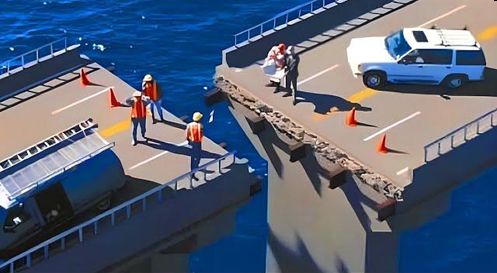
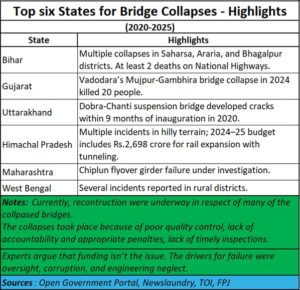
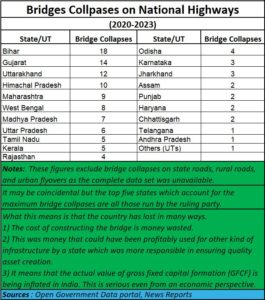
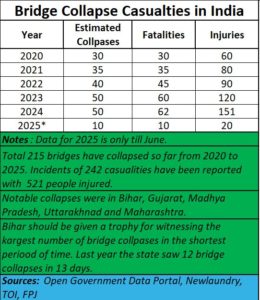
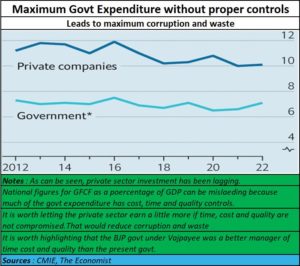








COMMENTS